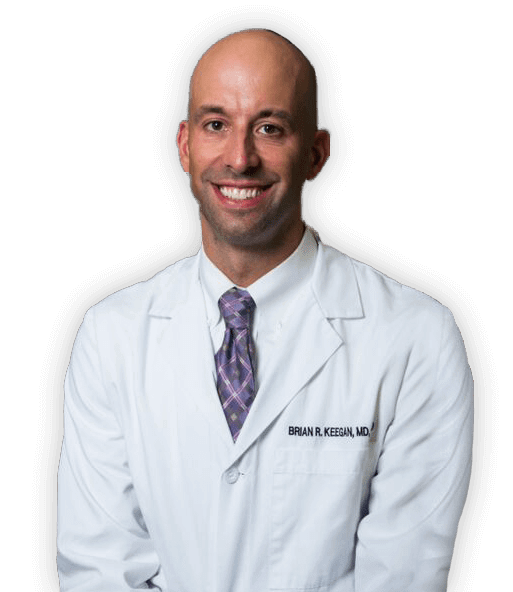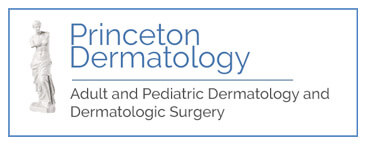
Proudly practicing at Princeton Dermatology Associates PC
Conveniently located at 5 Centre Drive, Suite 1A, Monroe Township, NJ 08831
Brian Keegan, M.D. Ph.D. FAAD
Brian Keegan M.D., Ph.D. is a Board-Certified Dermatologist and Fellow of the American Academy of Dermatology. He is on staff at the University of Pennsylvania Medicine, Medical Center at Princeton. In addition to general medical dermatology and skin cancer screening, Dr Keegan focuses on skin cancer, geriatric medicine, psoriasis and eczema.
Dr. Keegan has been a recipient of the NJ Top Doctor award for the last 6 years as well as the George Ioannides Resident Teaching Award. Furthermore, he has been awarded grants from the National Institute of Health, the American Medical Association, the Howard Hughes Association and the Hearst Foundation. He has participated in countless clinical trials and has authored many publications and advises multiple pharmaceutical companies on drug development for dermatological patients. He is also an editor of Journal of Clinical and Aesthetic Dermatology and is a member of the National Psoriasis Foundation Presidents Council and is a Gold Fundraiser.
Dr. Keegan received his Bachelor of Science from the University of Utah where he was Captain of the Swimming Team and received the Michael Wallace Award for Leadership. He continued his education at New York University were he earned his Master Degree, Medical Degree as well as his Doctorate of Philosophy. Following a year of residency in Transitional Medicine at St Vincent's Catholic Medical Center, Dr. Keegan completed his dermatological residency at the University of Miami Department of Dermatology and Cutaneous Surgery.
Dr. Keegan focuses on skin cancer, geriatric medicine, psoriasis and eczema.
Dr. Keegan Specializes In
Dr. Keegan’s Practice Philosophy
Below is a small excerpt from a publication that was prepared for Geriatric Dermatology. I have included it because I think it gives you some insight into my management style.
Skin Cancer
Skin cancer is another common problem that interferes with quality of life. Patients are often surprised to learn they have skin cancer, claiming they haven't been in the sun for years; however, they don't realize that it is common to have a 10-20 year delay from the time of exposure to the development of skin cancer. Another common question is: do I really need to have this examined and/or treated? The answer is clearly "YES!!" as untreated cancer will continue to grow and damage nearby structures decreasing the quality of life.
Furthermore, these spots can bleed and become infected and this always seems to happen at the worst time (weekends, holidays). This leads to the next point, treatment of these cancers is also unique in this population due to underlying medical conditions and medications (like blood thinners) thus it requires individuals with experience in geriatric dermatology. Specifically, less invasive methods like cryotherapy and curettage & desiccation are used in the place of aggressive surgery whenever possible. Furthermore, when surgery is performed the scope of the procedure is limited to only what is necessary.
Bruising
Bruising is the result of multiple issues including, thinning of the skin, changes in the skin architecture and usage of blood thinners like Coumadin, Plavix, Aspirin and new blood thinners. Currently, it is difficult or impossible to reverse or avoid these problems so individuals should be warned to ignore products that make outrageous claims of treatment success. In addition, they should be educated on how to treat wounds when they do develop.
Itching
Itching is another common problem that can stem from multiple issues. Common culprits include: medications, underlying medical problems, atrophy of sebaceous glands and dry or irritated skin. Thus, a complete assessment will entail a review of the patients medical issues including lab work, a review of the medications and a complete skin exam. If one is highly suspect of underlying medical issues or medications as a cause, every effort should be made to modify these factors in attempt to stop the itch. Next, treatment options typically involve various topical medications including: emollients, steroids, menthol. If necessary, systemic medications or photo-therapy can also be helpful although care must be taken not to generate more troublesome side effects or interactions with other critical medications.
Summary
In summary, geriatric dermatology requires a careful evaluation of all aspects of the patient and their medical history. Thus, all individuals in this population should be screened at least once per year to be sure they are not developing concerning issues.





